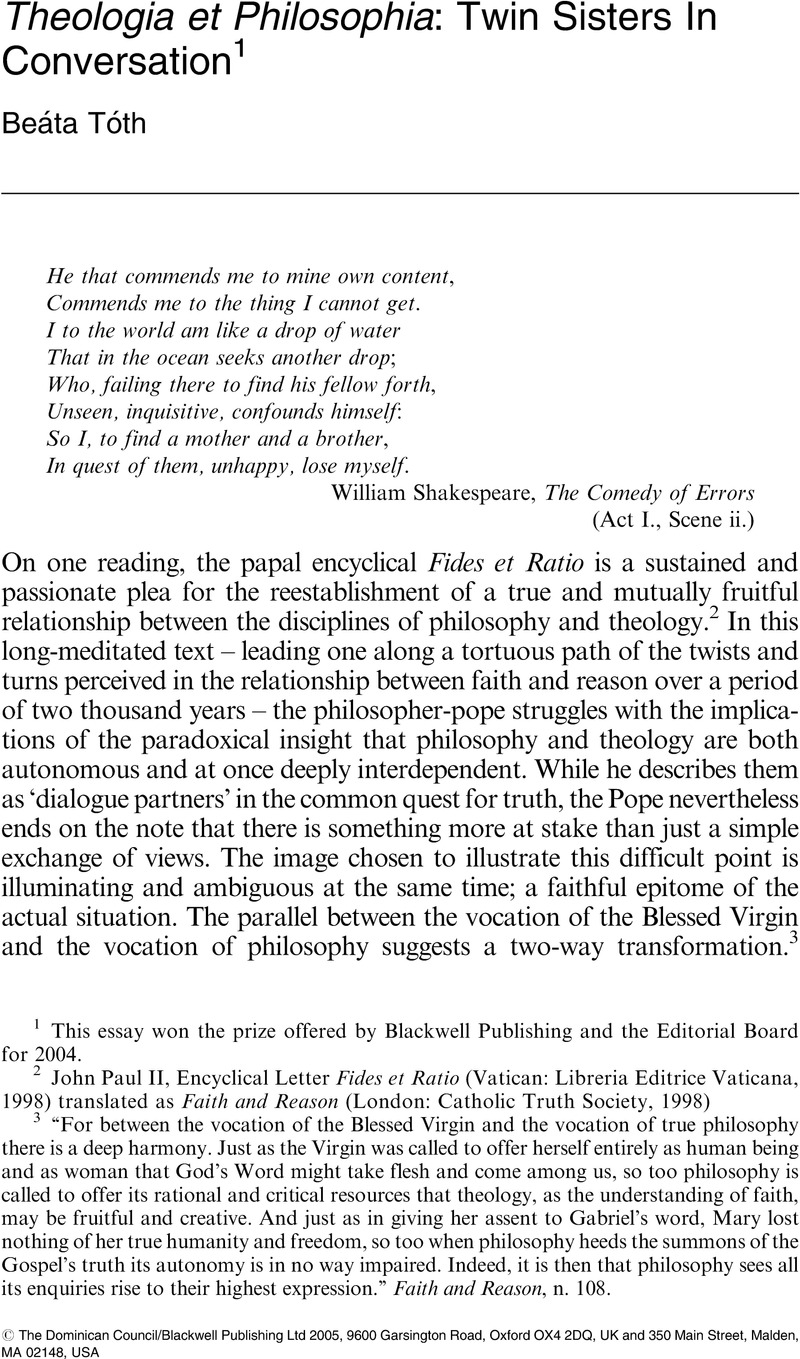No CrossRef data available.
Article contents
Theologia et Philosophia: Twin Sisters in Conversation
Published online by Cambridge University Press: 01 January 2024
Abstract

- Type
- Original Articles
- Information
- Copyright
- Copyright © The Dominican Council/Blackwell Publishing Ltd 2005, 9600 Garsington Road, Oxford OX4 2DQ, UK and 350 Main Street, Malden, MA 02148, USA
Footnotes
This essay won the prize offered by Blackwell Publishing and the Editorial Board for 2004.
References
2 Paul, John II, Encyclical Letter Fides et Ratio(Vatican: Libreria Editrice Vaticana, 1998)Google Scholar translated as Faith and Reason(London: Catholic Truth Society, 1998)Google Scholar
3 “For between the vocation of the Blessed Virgin and the vocation of true philosophy there is a deep harmony. Just as the Virgin was called to offer herself entirely as human being and as woman that God's Word might take flesh and come among us, so too philosophy is called to offer its rational and critical resources that theology, as the understanding of faith, may be fruitful and creative. And just as in giving her assent to Gabriel's word, Mary lost nothing of her true humanity and freedom, so too when philosophy heeds the summons of the Gospel's truth its autonomy is in no way impaired. Indeed, it is then that philosophy sees all its enquiries rise to their highest expression.”Faith and Reason, n. 108.
4 I borrow the idea of intimate ‘family others’ from William Desmond, who applies it to the relationship between philosophy and what he terms as its ‘others’: the aesthetic, the religious and the ethical as distinctive ways of being and mind. Desmond, William, Philosophy and Its Others: Ways of Being and Mind(Albany: State Univ. of New York Press, 1990)Google Scholar, esp. pp. 1–61.
5 On the theologian as literary critic see Tóth, Beáta, “‘Critical’ Theology? Notes on Theological Method”, Louvain Studies 26 (2001), pp. 99–116CrossRefGoogle Scholar.
6 On the relationship between the ‘theological fact’ and philosophy see Balthasar, Hans Urs von, ‘Theology and Philosophy’, in Kehl, Medard, Löser, Werner (eds.), The Von Balthasar Reader(New York: Crossroad, 1982), pp. 362–367Google Scholar.
7 See Nicolas Lash, ‘Anselm Seeking’ and ‘The Beginning and End of ‘Religion’?’, both in Lash, Nicolas, The Beginning and End of ‘Religion’(Cambridge: Cambridge Univ. Press, 1996), pp. 150–163CrossRefGoogle Scholar; pp. 3–25.
8 Marion, Jean‐Luc, God Without Being(Chicago: The Univ. of Chicago Press, 1991), pp. 156–158Google Scholar.
9 See Lacoste, Jean‐Yves, ‘Theologie’, in Lacoste, Jean‐Yves (ed.), Dictionnaire Critique de Théologie(Paris: Quadrige/PUF, 2002), p. 1144–1145Google Scholar.
10 See Balthasar, Hans Urs von, The Glory of the Lord: A Theological Aesthetics, vol. I: Seeing the Form(San Francisco: Ignatius Press; New York: Crossroad, 1982), pp. 142–147Google Scholar.
11 Ibid., p. 145.
12 See William Desmond's complex analysis of imagination in general and religious imagination in particular as a threshold endowment. Desmond, William, ‘Religious Imagination and the Counterfeit Doubles of God’, in Louvain Studies 27 (2002), pp. 280–305CrossRefGoogle Scholar.
13 Hans Urs von Balthasar has words to the effect that it would be a mistaken effort to try to deliver the ‘mute fullness of meaning’ encapsulated in myth by conceptualising it because what it lacks (in Kierkegaard's term) is ‘existence.’ In this sense, “[b]oth things, myth as well as concept, await the God‐Man in order to come into their own.” See Balthasar, Hans Urs von, The Glory of the Lord: A Theological Aesthetics, vol. I: Seeing the Form(San Francisco: Ignatius Press; New York: Crossroad, 1982), p. 508Google Scholar.
14 Lacoste, , ‘Philosophie’, in Lacoste, Jean‐Yves (ed.), Dictionnaire Critique de Théologie(Paris: PUF, 1998), pp. 901–906Google Scholar. See also the same entry in the second revised edition: Lacoste, ‘Philosophie’, in Dictionnaire Critique de Théologie, (2002), pp. 907–913.
15 The encyclical too makes mention of these notions of theological origin. See Faith and Reason, n. 76.
16 Lacoste, ‘Philosophie’, in Dictionnaire Critique de Théologie(1998), p. 904; and Lacoste, ‘Philosophie’, in Dictionnaire Critique de Théologie(2002), pp. 912–913.
17 See: Desmond, William, Philosophy and Its Others: Ways of Being and Mind(Albany: State Univ. of New York Press, 1990)Google Scholar For a definition of philosophy as ‘metaxological’ see esp. pp. 1–61.
18 Lacoste, ‘Philosophie’, in Dictionnaire Critique de Théologie, p. 912.
19 See Lacoste, ‘Être’, in Dictionnaire Critique de Théologie, p. 418.
20 See the introductory paragraph of the encyclical Faith and Reason.




